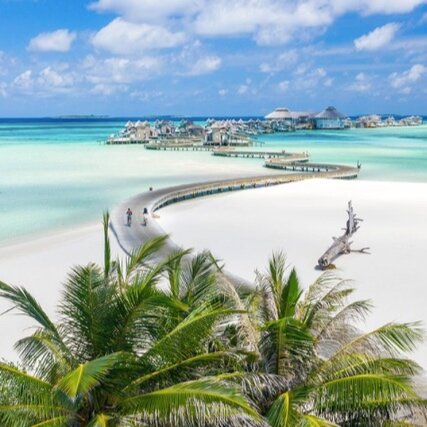When Sustainability Complements Luxury
My wife Eva and I first visited the Maldives in the 1980s. We fell in love with the country, holidayed here many times and, in the early 1990s, started to invest.
Sonu Shivdasani and wife Eva
Initially, we invested in Humming Bird helicopters, the country’s first domestic air transportation company. Then we moved into hotels, starting with Soneva Fushi, followed by Soneva Gili, Six Senses Laamu and, most recently, Soneva Jani. Over the years, the Maldives has become a second home to us.
When we opened Soneva Fushi in 1995, we held a firm belief that a company must have a clear purpose beyond just making money. A successful business is one that combines apparent contrast and makes ‘opposites’ compatible.
For example, at Soneva, we have created something that is both luxurious and environmentally sustainable; food that is both healthy and delicious. At Soneva, luxury and sustainability are not opposites, they actually feed off each other. In fact, the more sustainable we are, the more luxurious we become. When you blend opposites, it creates an experience that is unique, creating a strong level of guest loyalty.
Water Reserves, dining destinations and a wellness centre at Soneva Jani
Today, our guiding principle is creating for our guests engaging and imaginative SLOW LIFE, which stands for Sustainable, Local, Organic, Wellness, Learning, Inspiring, Fun, Experiences.
SLOW LIFE is both our moral and operating compass, and our focus on it has led to levels of guest loyalty and repeat business that far surpass industry norms. This tells us that a company’s values matter to those who consume its products. We have demonstrated how sustainable materials can have a great aesthetic.
Being able to bring out the beauty of nature, whether it is in our design, or the guest experiences that we offer, has set us apart from the competition.
We may sometimes fall short of our own high standards, but we are very clear about our responsibilities as custodians of the communities we operate in. This responsibility to one’s community is somewhat complicated for a company such as ours, whose guests jet in from all over the world. As a result, our social and environmental responsibilities are as much global as they are local.
Reusable glass bottles
We set up the Soneva Foundation to focus on local initiatives and to effect change at a level far beyond the communities in which our resorts operate.
One can argue that the Soneva Foundation is exceptional because nearly all of its funding is a result of changes to the way in which we do business at our resorts, and not donations. Let me explain:
- Twelve years ago, Eva and I noticed a huge number of plastic water bottles washed up on our beaches in the Maldives. We decided not to point fingers, especially as we were still serving bottled water in our resort. So, we decided to stop offering branded bottled water, and instead serve water that has been filtered, mineralised, alkalised, and bottled on site in reusable glass bottles.
- In 2008, we realised that our approach towards measuring carbon emissions was limited as we were not measuring guests’ international flights. To our great surprise, we discovered that 85% of the CO2 emissions from Soneva Fushi come from Scope 3 (indirect emissions), which the industry in general does not measure. So, we took the simple step of adding a mandatory 2% Environmental Levy to our guests’ bills, to off-set all our emissions. It was a small change, and a relatively small charge, which we found our guests more than happy to accept. And the rewards have been great. In twelve years we raised about USD 7 million, which the Soneva Foundation has used to fund a reforestation programme in northern Thailand, finance wind power generators in South India, and even a commitment to 150,000 low carbon cooking stoves in Myanmar and Darfur.
Sapphire waters surround Soneva Jani
Beach clean up to campaign against single-use plastics
- In the middle of 2019, we installed the first glass water bottling centre on one of our neighbouring islands, Baa, Maalhos. We filter and mineralize the desalinated island water and then store and distribute it in sterilized glass water bottles. When the bottles are returned, the consumer benefits from a 20% saving on their water purchase compared to if they had bought the water in plastic bottles. As I write, we have avoided 120,000 plastic bottles from being consumed.
- In February 2020, we celebrated a Maldives’ first: Maalhos became the first island in the country to end the practice of burning its rubbish in open bonfires. This was made possible by the opening of the island’s Eco Centro waste to wealth centre, funded by Soneva and modeled on Soneva Fushi’s own Eco Centro. Despite the COVID-19 crisis, we have paid the contractor to start work on the Eco Centro at Dharavandhoo. It is our hope that once this is complete, we will be able to start work on an Eco Centro in Kihaadhoo. We also plan to install an Eco Centro and water bottling plant at our next Soneva resort in the Maldives.
- We released a series of 10 Namoona Tutorial videos focussed on: preparing a growing space, planting, composting, maintenance, harvesting and enhancing the quality of the vegetables grown. We want to encourage people to grow their own healthy and nutritious vegetables at home. While the methods in the tutorials are based around the Maldives and similar tropical climates, the information can be applied to any garden. For more information, reach out to the Soneva Namoona team (soen-fushi@soneva.com).
Organic vegetable gardens provide greens to restaurant menus
- It is remarkable that many children in our island nation do not know how to swim. A fear of the water is compounded by a nationwide waste problem that sees local island beaches used as a dumping ground for household waste. Following one of our Soneva Symposiums (an ecological conference that unites entrepreneurs, policy makers and environmentalists, all passionate about improving the state of the planet) Soneva Fushi established the Soneva Ocean Stewards programme with neighbouring island of Eydhafushi. By teaching children to swim, we hope that they will learn to love their ocean, and when they love it, they will protect it. We are now looking to scale this programme to offer intensive swimming programmes across Baa Atoll, partnering with other resorts, local and national NGOs, environmental awareness groups and government ministries.
Learn to Swim Programme
In October 2018, I was diagnosed with stage four Lymphoma. Fortunately, today, I am fully recovered. My cure was a result of following traditional medicine such as chemotherapy, but combining this with alternative healing and importantly, a change to my diet. I dramatically reduced my consumption of sugar, white flour and importantly, dairy, and red meat, especially beef. Apart from overcoming cancer, I found that I became so much healthier than I have ever been.
We have similarly introduced a menu change at our resorts. Our chefs have reduced the amount of sugar, dairy, white flour and beef across all our menus. Beef consumption has been reduced by 75% in just one year. Dairy consumption has reduced considerably as well. It is our goal to bring the consumption of these two ingredients almost to zero. Apart from being good for our guests’ health, this approach has also been beneficial for the environment. According to the UN’s Food and Agriculture Organisation, animal agriculture and the associated deforestation is responsible for more than 18% of greenhouse gas emissions, dwarfing air travel, which is 2-3%.
Sonu with Richard Branson
The private sector has a significant role to play to find solutions, and we assume this responsibility as part of our core purpose.
Corporations should look to the history books and remember that having a purpose should be central to their mandate – and that this contribution should be measured and valued as robustly as any financial returns. Moreover, in a post COVID-19 world, consumers will be more conscious of the impact that they have on both nature and the communities which they visit.
We believe that the definition of luxury in the travel and tourism industry is not about tangibles such as the size of one’s villa, elaborate spa and wellness programmes, or an extensive number of restaurants. It is about the intangible – the magic that the Hosts that live and work at a property create. Magical service can only be trained to an extent. It has to be instilled. It has to come from the gut.
One can argue that the more Sustainable we are, and the more we embody our SlowLife Core Purpose; the more Luxurious we become. This is why Soneva is arguably one of the few hotel companies that have won the equivalent of the Oscars for both sustainability and luxury in the travel and tourism industry.
When the World Travel and Tourism Council met in 2008 in Dubai, and again in 2015 when they met in Madrid, they awarded us their Tourism for Tomorrow Award. In 2000 and 2008, the Readers of Condé Nast Traveller UK voted us the best resort of any category, i.e. the Best of the Best.
Our business philosophy is testament that if one is truly committed, humanity, sustainability, and accountability can all fully complement luxury.
Sonu Shivdasani | guest contributor | ws












